2011广东高考英语写作之读写任务
- 格式:doc
- 大小:38.00 KB
- 文档页数:10
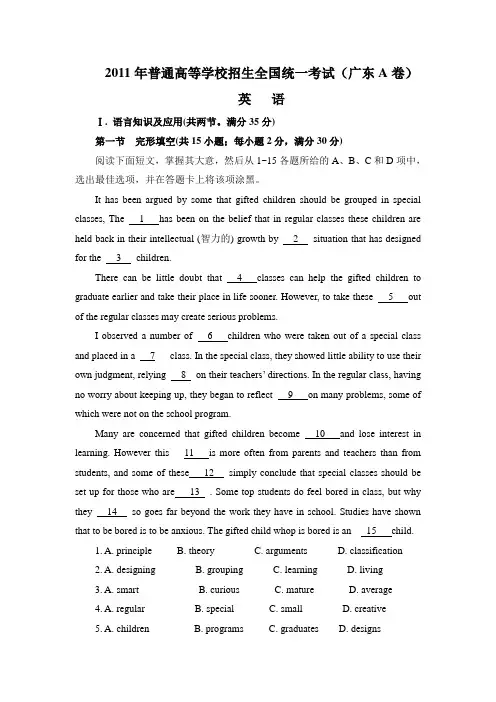
2011年普通高等学校招生全国统一考试(广东A卷)英语Ⅰ. 语言知识及应用(共两节。
满分35分)第一节完形填空(共15小题;每小题2分,满分30分)阅读下面短文,掌握其大意,然后从1~15各题所给的A、B、C和D项中,选出最佳选项,并在答题卡上将该项涂黑。
It has been argued by some that gifted children should be grouped in special classes, The 1 has been on the belief that in regular classes these children are held back in their intellectual (智力的) growth by 2 situation that has designed for the 3 children.There can be little doubt that 4 classes can help the gifted children to graduate earlier and take their place in life sooner. However, to take these 5 out of the regular classes may create serious problems.I observed a number of 6 children who were taken out of a special class and placed in a 7 class. In the special class, they showed little ability to use their own judgment, relying 8 on their teachers‟ directions. In the regular class, having no worry about keeping up, they began to reflect 9 on many problems, some of which were not on the school program.Many are concerned that gifted children become 10 and lose interest in learning. However this 11 is more often from parents and teachers than from students, and some of these 12 simply conclude that special classes should be set up for those who are 13 . Some top students do feel bored in class, but why they 14 so goes far beyond the work they have in school. Studies have shown that to be bored is to be anxious. The gifted child whop is bored is an 15 child.1. A. principle B. theory C. arguments D. classification2. A. designing B. grouping C. learning D. living3. A. smart B. curious C. mature D. average4. A. regular B. special C. small D. creative5. A. children B. programs C. graduates D. designs6. A. intelligent B. competent C. ordinary D. independent7. A. separate B. regular C. new D. boring8. A. specially B. slightly C. wrongly D. heavily9. A, directly B. cleverly C. voluntarily D. quickly10. A. doubted B. bored C. worried D. tired11. A. concern B. conclusion C. reflection D. interest12. A. students B. adults C. scholars D. teachers13. A. talented B. worried C. learned D. interested14. A. believe B. think C. say D. feel15. A. outstanding B. intelligent C. anxious D. ordinary第二节语法填空(共10小题;每小题1.5分,满分15分)阅读下面短文,按照句子结构的语法性和上下文连贯的要求,在空格处填入一个适当的词或使用括号中词语的正确形式填空,并将答案填写在答题卡标号为16~25的相应位置上。
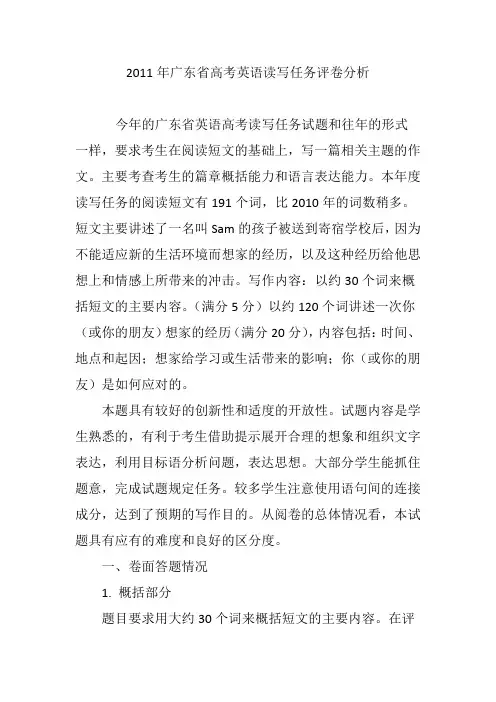
2011年广东省高考英语读写任务评卷分析今年的广东省英语高考读写任务试题和往年的形式一样,要求考生在阅读短文的基础上,写一篇相关主题的作文。
主要考查考生的篇章概括能力和语言表达能力。
本年度读写任务的阅读短文有191个词,比2010年的词数稍多。
短文主要讲述了一名叫Sam的孩子被送到寄宿学校后,因为不能适应新的生活环境而想家的经历,以及这种经历给他思想上和情感上所带来的冲击。
写作内容:以约30个词来概括短文的主要内容。
(满分5分)以约120个词讲述一次你(或你的朋友)想家的经历(满分20分),内容包括:时间、地点和起因;想家给学习或生活带来的影响;你(或你的朋友)是如何应对的。
本题具有较好的创新性和适度的开放性。
试题内容是学生熟悉的,有利于考生借助提示展开合理的想象和组织文字表达,利用目标语分析问题,表达思想。
大部分学生能抓住题意,完成试题规定任务。
较多学生注意使用语句间的连接成分,达到了预期的写作目的。
从阅卷的总体情况看,本试题具有应有的难度和良好的区分度。
一、卷面答题情况1. 概括部分题目要求用大约30个词来概括短文的主要内容。
在评卷过程中我们发现,大多数考生在概括部分都能抓住文章的主要信息点,不拘泥于原文的用词和表达方式,而是大胆地使用了各种复合句、分词短语、同义和近义表达等灵活多样的表现形式,体现出比较强的英语语言表达能力。
有两位考生是这样概括的:After being sent to a boarding school, Sam deeply fell into strong homesickness, which made him seve- rely angry with his parents and lonely because he couldn’t adjust to the boarding life at all and misunderstood his parents’ love.The article tells us that it’s the first time that Sam got to boarding school leaving his family,which made him have a homesickness and he didn’t adapt himself to his study life.有的考生照抄原文,依赖原文。
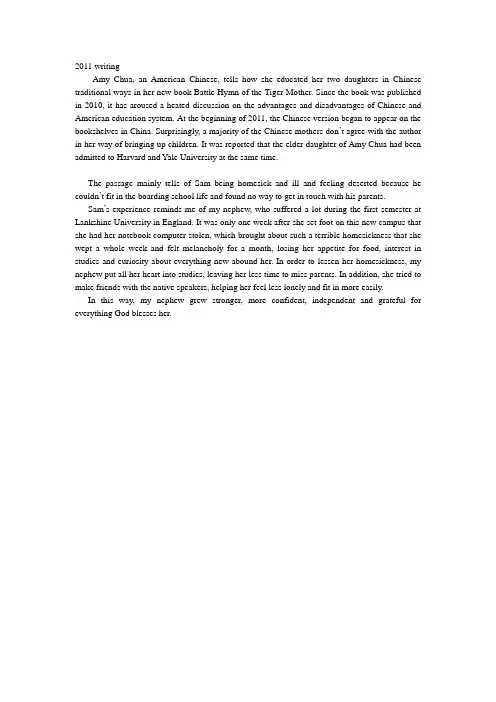
2011 writingAmy Chua, an American Chinese, tells how she educated her two daughters in Chinese traditional ways in her new book Battle Hymn of the Tiger Mother. Since the book was published in 2010, it has aroused a heated discussion on the advantages and disadvantages of Chinese and American education system. At the beginning of 2011, the Chinese version began to appear on the bookshelves in China. Surprisingly, a majority of the Chinese mothers don’t agree with the author in her way of bringing up children. It was reported that the elder daughter of Amy Chua had been admitted to Harvard and Y ale University at the same time.The passage mainly tells of Sam being homesick and ill and feeling deserted because he couldn’t fit in the boarding school life and found no way to get in touch with his parents.Sam’s experience reminds me of my nephew, who suffered a lot during the first semester at Lankshine University in England. It was only one week after she set foot on this new campus that she had her notebook computer stolen, which brought about such a terrible homesickness that she wept a whole week and felt melancholy for a month, losing her appetite for food, interest in studies and curiosity about everything new abound her. In order to lessen her homesickness, my nephew put all her heart into studies, leaving her less time to miss parents. In addition, she tried to make friends with the native speakers, helping her feel less lonely and fit in more easily.In this way, my nephew grew stronger, more confident, independent and grateful for everything God blesses her.。
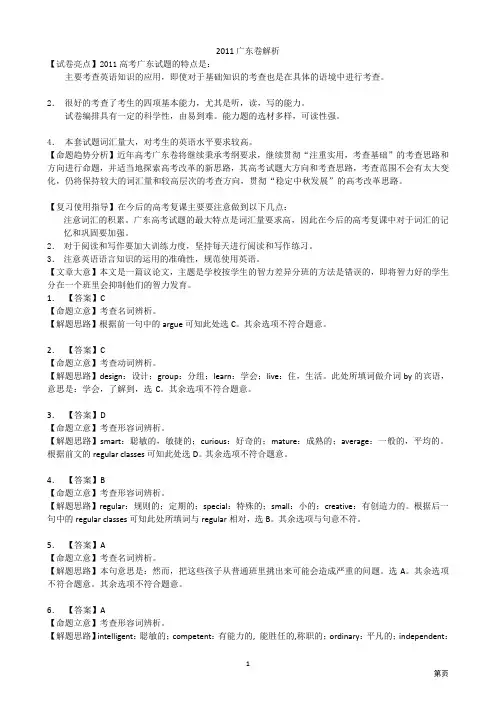
2011广东卷解析【试卷亮点】2011高考广东试题的特点是:主要考查英语知识的应用,即使对于基础知识的考查也是在具体的语境中进行考查。
2.很好的考查了考生的四项基本能力,尤其是听,读,写的能力。
试卷编排具有一定的科学性,由易到难。
能力题的选材多样,可读性强。
4.本套试题词汇量大,对考生的英语水平要求较高。
【命题趋势分析】近年高考广东卷将继续秉承考纲要求,继续贯彻“注重实用,考查基础”的考查思路和方向进行命题,并适当地探索高考改革的新思路,其高考试题大方向和考查思路,考查范围不会有太大变化,仍将保持较大的词汇量和较高层次的考查方向,贯彻“稳定中秋发展”的高考改革思路。
【复习使用指导】在今后的高考复课主要要注意做到以下几点:注意词汇的积累。
广东高考试题的最大特点是词汇量要求高,因此在今后的高考复课中对于词汇的记忆和巩固要加强。
2.对于阅读和写作要加大训练力度,坚持每天进行阅读和写作练习。
3.注意英语语言知识的运用的准确性,规范使用英语。
【文章大意】本文是一篇议论文,主题是学校按学生的智力差异分班的方法是错误的,即将智力好的学生分在一个班里会抑制他们的智力发育。
1.【答案】C【命题立意】考查名词辨析。
【解题思路】根据前一句中的argue可知此处选C。
其余选项不符合题意。
2.【答案】C【命题立意】考查动词辨析。
【解题思路】design:设计;group:分组;learn:学会;live:住,生活。
此处所填词做介词by的宾语,意思是:学会,了解到,选C。
其余选项不符合题意。
3.【答案】D【命题立意】考查形容词辨析。
【解题思路】smart:聪敏的,敏捷的;curious:好奇的;mature:成熟的;average:一般的,平均的。
根据前文的regular classes可知此处选D。
其余选项不符合题意。
4.【答案】B【命题立意】考查形容词辨析。
【解题思路】regular:规则的;定期的;special:特殊的;small:小的;creative:有创造力的。
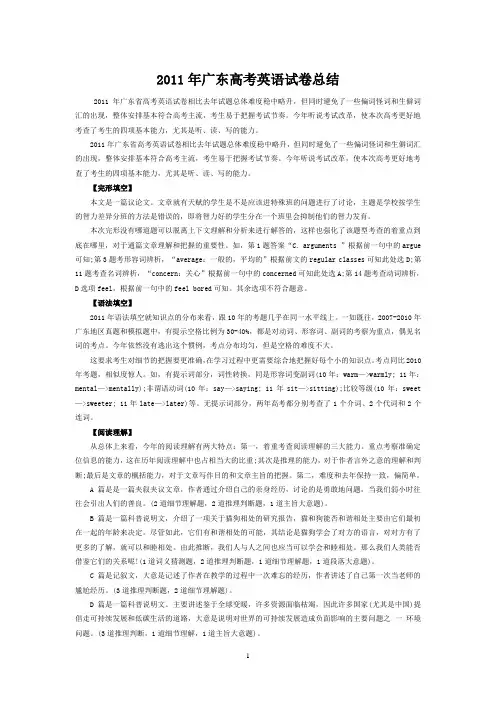
2011年广东高考英语试卷总结2011年广东省高考英语试卷相比去年试题总体难度稳中略升,但同时避免了一些偏词怪词和生僻词汇的出现,整体安排基本符合高考主流,考生易于把握考试节奏。
今年听说考试改革,使本次高考更好地考查了考生的四项基本能力,尤其是听、读、写的能力。
2011年广东省高考英语试卷相比去年试题总体难度稳中略升,但同时避免了一些偏词怪词和生僻词汇的出现,整体安排基本符合高考主流,考生易于把握考试节奏。
今年听说考试改革,使本次高考更好地考查了考生的四项基本能力,尤其是听、读、写的能力。
【完形填空】本文是一篇议论文。
文章就有天赋的学生是不是应该进特殊班的问题进行了讨论,主题是学校按学生的智力差异分班的方法是错误的,即将智力好的学生分在一个班里会抑制他们的智力发育。
本次完形没有哪道题可以脱离上下文理解和分析来进行解答的,这样也强化了该题型考查的着重点到底在哪里,对于通篇文章理解和把握的重要性。
如,第1题答案“C. arguments ”根据前一句中的argue 可知;第3题考形容词辨析,“average:一般的,平均的”根据前文的regular classes可知此处选D;第11题考查名词辨析,“concern:关心”根据前一句中的concerned可知此处选A;第14题考查动词辨析,D选项feel,根据前一句中的feel bored可知。
其余选项不符合题意。
【语法填空】2011年语法填空就知识点的分布来看,跟10年的考题几乎在同一水平线上。
一如既往,2007-2010年广东地区真题和模拟题中,有提示空格比例为30-40%,都是对动词、形容词、副词的考察为重点,偶见名词的考点。
今年依然没有逃出这个惯例,考点分布均匀,但是空格的难度不大。
这要求考生对细节的把握要更准确,在学习过程中更需要综合地把握好每个小的知识点。
考点同比2010年考题,相似度惊人。
如,有提示词部分,词性转换,同是形容词变副词(10年:warm—>warmly; 11年:mental—>mentally);非谓语动词(10年:say—>saying; 11年sit—>sitting);比较等级(10年:sweet —>sweeter; 11年late—>later)等。
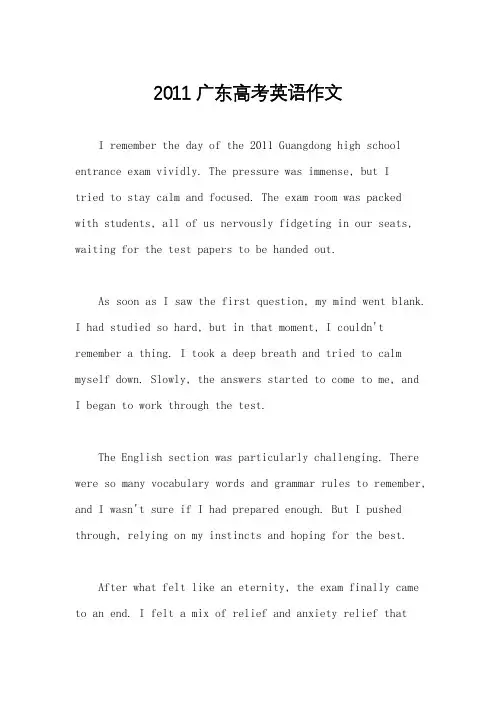
2011广东高考英语作文I remember the day of the 2011 Guangdong high school entrance exam vividly. The pressure was immense, but Itried to stay calm and focused. The exam room was packedwith students, all of us nervously fidgeting in our seats, waiting for the test papers to be handed out.As soon as I saw the first question, my mind went blank.I had studied so hard, but in that moment, I couldn't remember a thing. I took a deep breath and tried to calm myself down. Slowly, the answers started to come to me, and I began to work through the test.The English section was particularly challenging. There were so many vocabulary words and grammar rules to remember, and I wasn't sure if I had prepared enough. But I pushed through, relying on my instincts and hoping for the best.After what felt like an eternity, the exam finally came to an end. I felt a mix of relief and anxiety relief thatit was over, but anxiety about how I had performed. I knew that the results of this exam would have a huge impact on my future, and the uncertainty was almost unbearable.In the end, I was pleased with my performance. I knew I had given it my all, and that was all I could do. Now, all I could do was wait for the results and hope for the best.。
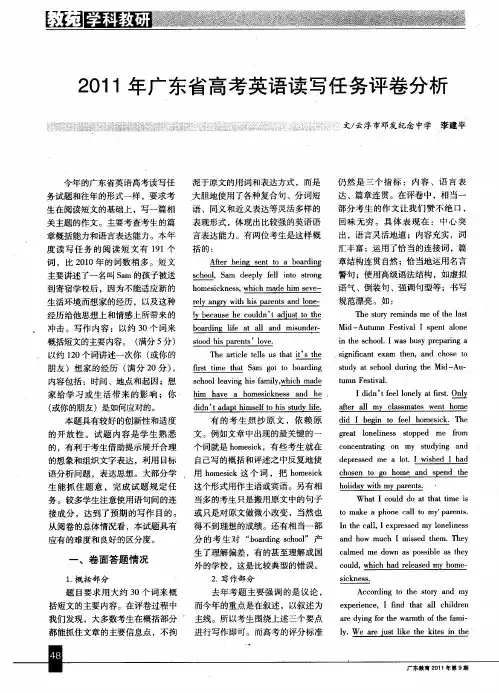
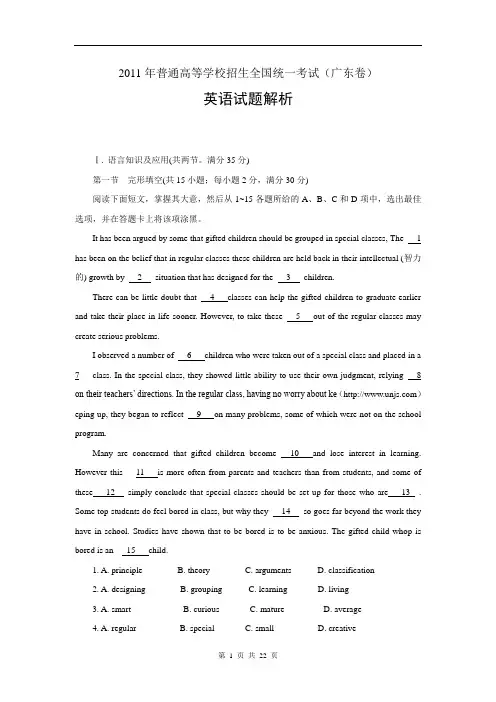
2011年普通高等学校招生全国统一考试(广东卷)英语试题解析Ⅰ. 语言知识及应用(共两节。
满分35分)第一节完形填空(共15小题;每小题2分,满分30分)阅读下面短文,掌握其大意,然后从1~15各题所给的A、B、C和D项中,选出最佳选项,并在答题卡上将该项涂黑。
It has been argued by some that gifted children should be grouped in special classes, The 1 has been on the belief that in regular classes these children are held back in their intellectual (智力的) growth by 2 situation that has designed for the 3 children.There can be little doubt that 4 classes can help the gifted children to graduate earlier and take their place in life sooner. However, to take these 5 out of the regular classes may create serious problems.I observed a number of 6 children who were taken out of a special class and placed in a7 class. In the special class, they showed little ability to use their own judgment, relying 8 on their teachers’ directions. In the regular class, having no worry about ke()eping up, they began to reflect 9 on many problems, some of which were not on the school program.Many are concerned that gifted children become 10 and lose interest in learning. However this 11 is more often from parents and teachers than from students, and some of these 12 simply conclude that special classes should be set up for those who are 13 . Some top students do feel bored in class, but why they 14 so goes far beyond the work they have in school. Studies have shown that to be bored is to be anxious. The gifted child whop is bored is an 15 child.1. A. principle B. theory C. arguments D. classification2. A. designing B. grouping C. learning D. living3. A. smart B. curious C. mature D. average4. A. regular B. special C. small D. creative5. A. children B. programs C. graduates D. designs6. A. intelligent B. competent C. ordinary D. independent7. A. separate B. regular C. new D. boring8. A. specially B. slightly C. wrongly D. heavily9. A, directly B. cleverly C. voluntarily D. quickly10. A. doubted B. bored C. worried D. tired11. A. concern B. conclusion C. reflection D. interest12. A. students B. adults C. scholars D. teachers13. A. talented B. worried C. learned D. interested14. A. believe B. think C. say D. feel15. A. outstanding B. intelligent C. anxious D. ordinary第二节语法填空(共10小题;每小题1.5分,满分15分)阅读下面短文,按照句子结构的语法性和上下文连贯的要求,在空格处填入一个适当的词或使用括号中词语的正确形式填空,并将答案填写在答题卡标号为16~25的相应位置上。
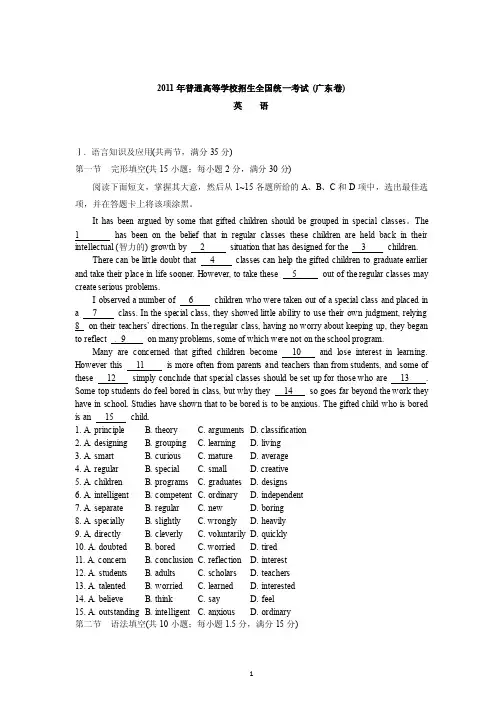
2011年普通高等学校招生全国统一考试(广东卷)英语Ⅰ. 语言知识及应用(共两节,满分35分)第一节完形填空(共15小题;每小题2分,满分30分)阅读下面短文,掌握其大意,然后从1~15各题所给的A、B、C和D项中,选出最佳选项,并在答题卡上将该项涂黑。
It has been argued by some that gifted children should be grouped in special classes。
The 1 has been on the belief that in regular classes these children are held back in their intellectual (智力的) growth by 2 situation that has designed for the 3 children.There can be little doubt that 4 classes can help the gifted children to graduate earlier and take their place in life sooner. However, to take these 5 out of the regular classes may create serious problems.I observed a number of 6 children who were taken out of a special class and placed ina 7 class. In the special class, they showed little ability to use their own judgment, relying8 on their teachers’ directions. In the regular class, having no worry about keeping up, they began to reflect 9 on many problems, some of which were not on the school program.Many are concerned that gifted children become 10 and lose interest in learning. However this 11 is more often from parents and teachers than from students, and some of these 12 simply conclude that special classes should be set up for those who are 13 . Some top students do feel bored in class, but why they 14 so goes far beyond the work they have in school. Studies have shown that to be bored is to be anxious. The gifted child who is bored is an 15 child.1. A. principle B. theory C. arguments D. classification2. A. designing B. grouping C. learning D. living3. A. smart B. curious C. mature D. average4. A. regular B. special C. small D. creative5. A. children B. programs C. graduates D. designs6. A. intelligent B. competent C. ordinary D. independent7. A. separate B. regular C. new D. boring8. A. specially B. slightly C. wrongly D. heavily9. A, directly B. cleverly C. voluntarily D. quickly10. A. doubted B. bored C. worried D. tired11. A. concern B. conclusion C. reflection D. interest12. A. students B. adults C. scholars D. teachers13. A. talented B. worried C. learned D. interested14. A. believe B. think C. say D. feel15. A. outstanding B. intelligent C. anxious D. ordinary第二节语法填空(共10小题;每小题1.5分,满分15分)阅读下面短文,按照句子结构的语法性和上下文连贯的要求,在空格处填入一个适当的词或使用括号中词语的正确形式填空,并将答案填写在答题卡标号为16~25的相应位置上。
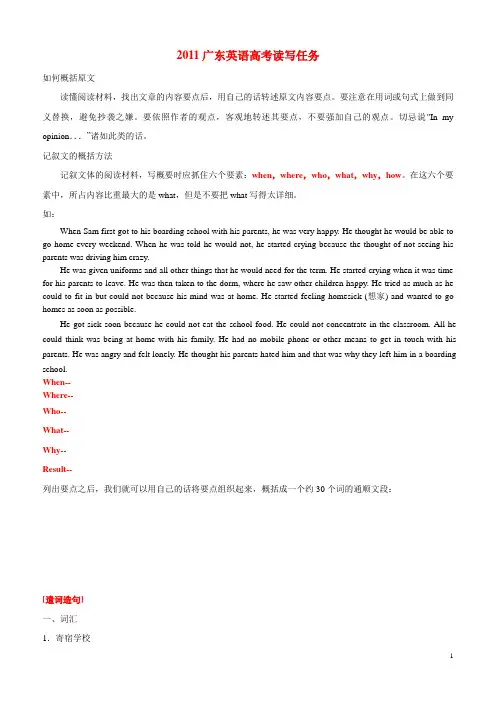
2011广东英语高考读写任务如何概括原文读懂阅读材料,找出文章的内容要点后,用自己的话转述原文内容要点。
要注意在用词或句式上做到同义替换,避免抄袭之嫌。
要依照作者的观点,客观地转述其要点,不要强加自己的观点。
切忌说"In my opinion...”诸如此类的话。
记叙文的概括方法记叙文体的阅读材料,写概要时应抓住六个要素:when,where,who,what,why,how。
在这六个要素中,所占内容比重最大的是what,但是不要把what写得太详细。
如:When Sam first got to his boarding school with his parents, he was very happy. He thought he would be able to go home every weekend. When he was told he would not, he started crying because the thought of not seeing his parents was driving him crazy.He was given uniforms and all other things that he would need for the term. He started crying when it was time for his parents to leave. He was then taken to the dorm, where he saw other children happy. He tried as much as he could to fit in but could not because his mind was at home. He started feeling homesick (想家) and wanted to go homes as soon as possible.He got sick soon because he could not eat the school food. He could not concentrate in the classroom. All he could think was being at home with his family. He had no mobile phone or other means to get in touch with his parents. He was angry and felt lonely. He thought his parents hated him and that was why they left him in a boarding school.When--____________________________Where--____________________________Who--____________________________What--____________________________Why--____________________________Result--____________________________列出要点之后,我们就可以用自己的话将要点组织起来,概括成一个约30个词的通顺文段:_____________________________________________________________________________________________ _____________________________________________________________________________________________ _____________________________________________________________________________________________[遣词造句]一、词汇1.寄宿学校____________________________2.想念父母____________________________3.生病____________________________4.专心学习____________________________5.事实上____________________________6.想家的经历____________________________7.适应那儿的气候____________________________8.感到孤独____________________________9.与……交流____________________________10.与某人交朋友____________________________二、句式1.翻译下列句子(1)山姆是一名学生。
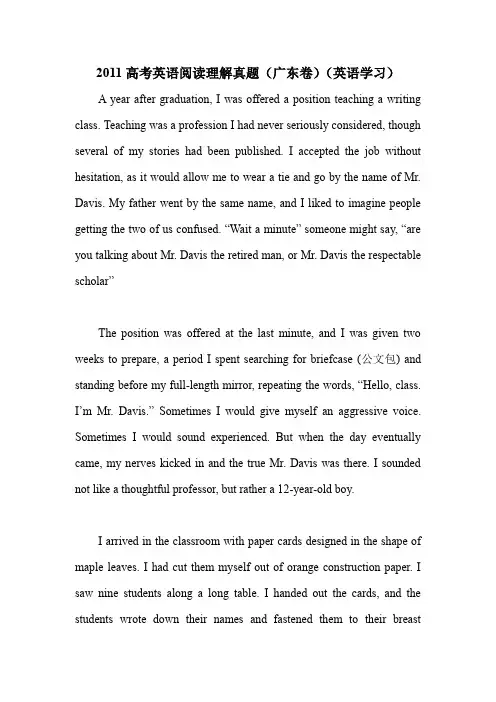
2011高考英语阅读理解真题(广东卷)(英语学习)A year after graduation, I was offered a position teaching a writing class. Teaching was a profession I had never seriously considered, though several of my stories had been published. I accepted the job without hesitation, as it would allow me to wear a tie and go by the name of Mr. Davis. My father went by the same name, and I liked to imagine people getting the two of us confused. “Wait a minute” someone might say, “are you talking about Mr. Davis the retired man, or Mr. Davis the respectable scholar”The position was offered at the last minute, and I was given two weeks to prepare, a period I spent searching for briefcase (公文包) and standing before my full-length mirror, repeating the words, “Hello, class. I’m Mr. Davis.” Sometimes I would give myself an aggressive voice. Sometimes I would sound experienced. But when the day eventually came, my nerves kicked in and the true Mr. Davis was there. I sounded not like a thoughtful professor, but rather a 12-year-old boy.I arrived in the classroom with paper cards designed in the shape of maple leaves. I had cut them myself out of orange construction paper. I saw nine students along a long table. I handed out the cards, and the students wrote down their names and fastened them to their breastpockets as I required.“All right then,” I said. “Okey, here we go.” Then I opened my briefcase and realized that I had never thought beyond this moment. I had been thinking that the students would be the first to talk, offering their thoughts and opinions on the events of the day. I had imagined that I would sit at the edge of the desk, overlooking a forests of hands. Every student would yell. “Calm down, you’ll all get your turn. One at a time, one at a time!”A terrible silence ruled the room, and seeing no other opinions, I inspected the students to pull out their notebooks and write a brief essay related to the theme of deep disappointment.36. The author took the job to teach writing because ______.A. he wanted to be expectedB. he had written some storiedC. he wanted to please his fatherD. he had dreamed of being a teacher37. What can we learn about the author from Paragraph 2A. He would be aggressive in his first class.B. He was well-prepared for his first class.C. He got nervous upon the arrival of his first class.D. He waited long for the arrival of his first class.38. Before he started his class, the author asked the students to ______.A. write down their suggestions on the paper cardsB. cut maple leaves out of the construction paperC. cut some cards out of the construction paperD. write down their names on the paper cards39. What did the students do when the author started his classA. They began to talk.B. They stayed silent.C. They raised their hands.D. They shouted to be heard.40. The author chose the composition topic probably because ______.A. he got disappointed with his first classB. he had prepared the topic before classC. he wanted to calm down the studentsD. he thought it was an easy topic【文章大意】本文是一篇记叙文。
高三英语写作辅导材料——“读写任务”专题指导一、常用文章开头、展开及结尾的句式:1. Summary:1).In this passage, the writer (author) explains/writes about......2).The passage/article points out/presents/states/compares/introduces/mainlytells us......3).We can learn from the passage that......4).The passage tells us a story of......, who....... . Through the story, theauthor presents an idea that...... (记叙+寓意)5).As can be learned from the passage,6).The passage compares the benefits of A with B. Some argue in support of A,believing that..., while others prefer B, stating that......(议论文)7).The writer sets some examples to tell us……2. 过渡句:1).I can’t agree more with the author.2).I agree with what is presented above.3).The view sounds right /reasonable but it is hardly practical.(议论文)4).Personally, I prefer ......5).Different people have different opinions on this point.Some...,.. Others.....(两种观点)6). In my opinion, it is right for sb. to do......7). This story reminds me of an accident that I witnessed.8). Another example that jumps into my mind is......9).I have a similar (the same) experience.10).What Peter did reminds me of a story that happened two years ago.(记叙文)3. 结束段(句):1).In conclusion/short/brief,...2).As is stated above, both advantages and disadvantages. My opinion is that...(呼应文章主题或标题)3).In a word, we have to strike/achieve a balance between A and B.Only if/when/after/by/in......, can we do......(谈论两种事物时常用)4).From what has been discussed above, we may safely draw the conclusion that...5).Taking all the above-mentioned factors into consideration,……..4. 解题技巧:A. 标题:一般要有,07高考写信没法再拟标题。
2011广东高考英语一、前言2011年广东高考英语考试是高中毕业生进入大学的重要一站。
本文将对2011年广东高考英语试题进行解析和分析,帮助考生了解试题内容和解题思路,提高答题水平。
二、试题概述2011年广东高考英语试卷共分为听力、语言知识运用、阅读理解和写作四个部分,题型多样,涵盖了英语听说读写的方方面面。
试卷难度适中,符合广东高考的命题特点,对考生的英语综合能力进行全面考察。
三、试题详解1. 听力部分听力部分是英语考试的第一部分,共有五个听力任务。
考生需要通过听力材料回答一系列问题。
本次试题听力材料主要涉及日常生活对话、公共场所广播和新闻报道,考察对话交际能力和听力理解能力。
2. 语言知识运用部分语言知识运用部分是英语考试的第二部分,主要考察考生对语法、词汇和句子结构等方面的掌握程度。
本次试题共有多项选择题、完形填空和改错题等,要求考生准确理解句子意思,灵活运用英语语法规则。
3. 阅读理解部分阅读理解部分是英语考试的第三部分,考察考生的阅读理解能力和信息提取能力。
本次试题共有短文理解题、阅读填空题和匹配题等,要求考生能够快速阅读并准确把握文章主旨,理解文章中的细节信息。
4. 写作部分写作部分是英语考试的最后一部分,要求考生写一篇短文,表达自己的观点和想法。
本次试题要求考生以“我的梦想”为题目,描述自己的梦想并解释梦想对自己的意义。
四、复习建议针对本次试题,考生可以通过以下方法进行复习:1.针对听力部分,多听英语听力材料,提高听力和理解能力。
2.完形填空和改错题考察语法和词汇掌握,可以通过练习题来提高自己的语言运用能力。
3.阅读理解部分要求考生快速阅读和准确把握文章信息,可以通过阅读英文文章来提高自己的阅读理解能力。
4.写作部分要求考生能够表达自己的观点和想法,可以多写作练习来提高自己的写作水平。
五、总结2011年广东高考英语试题全面考察了考生的英语听说读写能力。
考生在复习和备考过程中,应该重点关注听力和口语能力的提高,同时注重语法和词汇的掌握。
2011广东高考英语题型分析2011年广东高考英语试题是一份很好的兼顾了试题的公平性、作答的可操作性以及对考生区分度的试题。
我们可以看到整卷各个篇章的内容,基本上都是同学在平常学习生活在各种媒体报道上会看到听到了解到的内容,而这样的内容本身可以大大降低不同生活的环境对来自不同地方的考生在作答时候的影响,从而保证了它的一个公平性。
第二方面,各个题型的题目设置都很到位地考察了考生在各个方面的英语(论坛)学科的能力。
以下我们逐个题型的来进行分析.完形填空这次的完型没有哪道题可以脱离上下文理解和分析来进行解答的,这样也强化了这个题型考查的着重点到底在哪里。
我在我的课程中也多次强调,对于通篇文章理解和把握的重要性。
语法填空顾名思义,语法填空考语法,但是这样的语法知识、技能的分析和运用是不能完全脱离对语境的分析的,当我们在答题的时候,必须要结合对于全文所描述故事的理解,才能判断出来,先把握语义,才能去到语法层面进行分析。
这也是我在我的课程中一直强调的,对于通篇的把握先于对于细节的分析。
如果掌握这点的同学,相信这次的语法填空题不会觉得太难。
但是假如你是脱离语篇、语境、语义的话,可能有的题目你就会觉得模凌两可,不好把握。
阅读理解阅读理解篇幅和题量本身就能够保障对于考生不同阅读理解能力的考查。
从这次4个阅读理解的篇章来看,首先我们没有遇到特别生僻的内容。
其次,题目设置的相当的好,里面很多题目通过分析就可以直接解答。
另外,大部分题都是可以简单的排除掉两个答案,学生需要通过细微的比较从另外两个答案中筛选出最后的答案。
这样的设置本身就能保证一个比较科学的区分度。
从阅读理解的题目设置,也让我们把握到高考还是聚焦在我们对于文段的理解以及对于考场阅读技巧的一种把握。
信息匹配题信息匹配题还是有一定的阅读量,而且里面似乎有词同学会觉得非常难,但是你能把握题型的特点话就会非常明晰,考生要做的就是快速捕捉到信息匹配的要点在哪里,并且学会利用不同的信息来源,既能利用文字的信息,同时还有图片的信息,能够做到这点的话,其实信息匹配本身是一个送分题。
练练看14答案:语法选择题1-5 CCBDA6-10 DCADD 11-15. DBBAD完形填空16-20 BCCCB 21-25 ADCAB 26-30 ACCAB读你千篇新4答案:Passage 12 DDBCP13CADCP14DBACP15DAA2010广东高考英语写作之读写任务(共1小题,满分25分)阅读下面的短文,然后按照要求写一篇150词左右的英语短文。
In junior high school, one of my classmates, Eithan, was addicted to TV. This boy simply knew everything about such pop shows as Who’s the Boss?Then one day Ethan’s mother made him an offer in order to draw him back to his school subjects. She promised that she would give him $200 if he could go a full month without watching any TV. None of us thought Ethan could do it, but he did quit TV. His mom paid him $200. He went out and bought a TV, the biggest he could find.In recent years, hundreds of schools have carried out experiments with paying kids with cash for showing up or getting good grades. All school kids admire this trend. But it upsets adults. Teachers say that we are rewarding kids for doing what they should be doing of their own will.Psychologists warn that money can actually make lies perform worse by making the act of learning cheap. The debate has become a typical battle over why our kids are not learning at the rate they should be despite decades of reforms and budget increases.[写作内容]1.以约30词概括上文的主要内容。
2.以约120词对用金钱鼓励孩子学习的现象进行议论,内容包括:(1)你对用金钱鼓励孩子学习的看法:(2)你的父母(或其他亲人)是如何鼓励你学习的;(3)你认为怎样才能更好地鼓励孩子学习[写作要求]1.作文中可以使用亲身经历或虚构的故事,也可以参照阅读材料的内容,但不得直接引用原文中的句子。
2.作文中不能出现真实姓名和学校名称。
[评分标准]概括准确,语言规范,内容合适,语篇连贯。
Possible Summary:The passage is mainly about parents give money to their children so that they can show up or get good grades recently by the way of taking the example of Ethan and his mother.The passage tells us Enthan’s mother and many schools rewarded kids with cash to improve their performance and change their bad habits.However,psychologists point out it will cause negative consequences.As far as I’m concerned…..encouraging kids with cash will….Take one of my classmates as a typical example,he …..As a result,not only did he not become a good student but worse still,it aggravated his sereve situation.Bing no exception,my parents also care about my studying.but they…..Finally,I became a top students in my class.From what has been mentioned above,we can draw the conclusion that….On one hand…..On the otherhand…..Only in these ways can parents make their kids grow up healthfully.***We should not give fixed or so-called standard version. Approaches of writing the next part are open and answers may vary.写作导引:以下要求写一个用金钱鼓励孩子的现象的讨论。
属议论文,内容应该涉及原因分析和利弊对比列举,上文有例有议,但属简单陈述,教师,家长和所谓专家等的看法。
那么,写此篇文章理应有类似议论,还得有假设的论据,然后再表达自己的看法,此处要观点鲜明,但要注意立场。
你就是那个对象。
当然,拿邻家小弟小妹为例也行。
该题特别注意写作内容1)和3)的异同,尤其是3)。
以下两段文字可作为开拓思路之参考。
Some reference expressions on this topic for your writing:Should We Reward Children for Good Report Cards?“$10 for each A, $5 for each B, $2 for each C, andnothing for Ds and Fs. That sound fair?”“Sure dad.”Does this interchange between parent and child sound familiar? Then perhaps it is because you have been on the giving or receiving end. It represents a common situation—parents offering children rewards for good report card grades. While no one will dispute the idea that children appreciate the money, the issue we must address is whether such a practice has detrimental effects on children’s intrinsic motivation f or learning and achievement.As we have seen, the answer depends on how children interpret the reward contingency. Some may view it as controlling their behavior. They need or want the money, and to earn it they must study hard and make good grades. Th is perception of control of one’s behavior by others would be predicted to lead to a decline in intrinsic motivation for learning. Conversely, other children may view the contingency as a reward for their achievement and as a recognition by others of that achievement. For these children we should not expect a decrease in intrinsic motivation, and the contingencymight even help build children’s intrinsic motivation forachieving in school.We do not take a position on whether parents shouldoffer children rewards for good grades. We recommend,however, that parents who choose to do this keep a fewpoints in mind.∙Try to link the reward to progress or achievement. A reward offered for improvement (e.g., C to a B)signals progress when the child receives it, which canbuild self-efficacy and motivation. Likewise, a rewardoffered for achieving well in a tough course signalscompetence when the child receives it. Conversely, areward offered for an A in a course where everyonegets an A does not convey the same type ofcompetency information.∙Second, emphasize the link of the reward with achievement, not the offer. Although children may come to expect rewards for good grades, saying nothing in advance (i.e., no offer) but then rewarding children when they receive a good report card de-emphasizes the offer and links the reward with achievement.Finally, try moving rewards away from report cards and to other forms of achievement. Rewarding a childfor a high A on a test (perhaps the highest grade in theclass) that the child has studied hard for signalscompetence and that diligent studying can lead topositive outcomes. By not offering theseno-report-card rewards in advance, parents can help to build children’s self-efficacy, motivation, and positive outcome expectations by taking advantage of natural contingencies as they arise.Do you pay your child for good grades?When your child achieves good grades at school, do you reward her/him with cash, savings bonds, stock, or other financial pay-outs? If yes, how is your incentive system structured (e.g., do A's earn more than B's, etc.?).Parent A: Yes. Your child should know that hard work is being rewarded but only if he\she is working hard. I know some kids who get good grades but do not work hard. I guess they are naturally clever. Base the amount of money on the amount of work they have donebut don't spoil them. Reward them with other ways as well. Take them out or go see a movie. Use your imagination.Parent B: We raised two boys. We did not routinely reward them for all good grades. Nevertheless, we did provide incentives for grades only when we believed that for a given subject they could do better. Example, when my son received a B, and if I knew he did not try hard, I would give him an incentive to perform better. Hence, we tried to target incentives designed to make improvements in subject where we knew he had an aptitude.Parent C: Of the factors that influence student learning, motivation is surely one of the most potent.What the Expert Says:Kids who are rewarded for good grades--especially with any form of money--will quickly learn that all that has any value is money, and not much else. I think it is important to ask yourself if this is, in fact the message you want to communicate to your child.By giving value only to the outcome (the gradeachieved), and no value to the process by which the outcome was achieved you miss the very important opportunity to help your child learn how to learn and how to work hard--both critical life skills. By paying your child for grades you don't ever ask: did you work hard? Did you plan well? Did you work cooperatively with others? Are you reading a more challenging book (or in a more difficult class) that might make it harder to get an A, but is better use of brain power?The message you give your child by paying for grades is that you care about the outcome and not the process by which the outcome is achieved. This is a slippery slope in the world of parenting because kids need to be valued for who they are, NOT for their achievements. In fact we can take this a step further, kids need to be valued by their parents for who they are on the inside, not by what they 'look like' on the outside (grades, clothing, size/shape, popularity). In addition, it is difficult to quantify the value of a grade--one child may work very hard for a "B" and another in the same family may easily achieve an "A", so how would you monetarily reward these achievements...it can causesibling rivalry, jealousy and resentment.For all these reasons, I'd strongly caution you to steer away from motivating with money.Good Wishes and Great Parenting,Dr. Susan BartellFrom 。